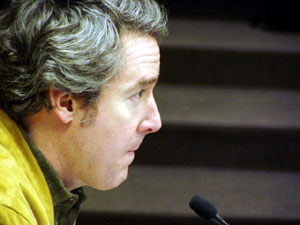Audio
Photos
More from MPR
Your Voice
| |||||||||||||||||||||||||||||||||||||||||||||||||||||||
Commission narrows list of stadium proposals to four
January 22, 2004
Gov. Tim Pawlenty's Stadium Screening Committee has pared a list of competing proposals down to four contenders: two each for the Minnesota Twins and Vikings. As expected, committee members selected locations in downtown Minneapolis and St. Paul as possible sites for a Twins ballpark. Blaine and Eden Prairie are the two possibilities for the Vikings. But other crucial parameters, such as how the state might assist ballpark financing, remain controversial. And state officials and the two teams clearly disagree about how to proceed on that front.
St. Paul, Minn. — The four stadium finalists each made the final cut after committee members determined that they offered the best prospects for success. But the task force chose not to shorten the list any further.
 | |||
Sen. Steve Kelley, DFL-Hopkins, who serves on the committee, responded to a complaint that the group hadn't acted decisively enough, Kelley argued that state lawmakers would lose interest in a stadium solution if their hometown was cut from the running.
"Any group I've been involved in wants to feel like it's gotten something done. So it important to make as many decisions as possible. But, with respect to site selection, the more open it is, the easier it is to get votes," he said.
The committee also left several crucial issues unresolved. A Twins stadium is estimated to cost between $520 and $535 million. A Vikings facility could top $600 million. All of the financing proposals attached to the four sites require significant levels of state or regional funding to complete the deal.
Committee chair Dan McElroy, who is leaving his post as finance commissioner to be Gov. Pawlenty's chief of staff, says the governor has ruled out using general state revenues to build stadiums. But he says state funding doesn't necessarily mean state government funding.
McElroy says individual fans from across the state could be persuaded to pitch in. With that in mind, McElroy has been promoting the sale of personal seat licenses as a revenue source. PSLs offer fans the right to purchase season tickets in a newly-completed facility. And McElroy says they've helped build stadiums in other parts of the country.
"I think you tell the community the only way we can build this is if there's a fan contribution. And when the PSLs are sold, when the team puts up their money, when local taxes are levied we maybe can do it," according to McElroy.
 | |||
But Twins Sports President Jerry Bell says PSL revenue should flow to the team. Bell says if policy-makers start redirecting new revenues away from the club, it undermines the entire point of a new ballpark.
"They establish a proposal, and then they start to pick off all the revenue streams. And, you know, we were very clear in our presentation early on that a Type I proposal gets the stadium built. A Type II proposal doesn't. And when you start to pick off all the revenue streams, it becomes a Type II proposal. It sounds good politically, and nothing gets done," Bell said.
Vikings Vice President Mike Kelly says it's misleading to characterize PSL revenues as part of a "state contribution." He says those dollars clearly belong to the franchise.
"It's ticket sales. Basically, you're charging a premium on the ticket sales. So it's money that ultimately is generated by the club, not by the state. And it's not a tax, for example," Kelly said.
If the state share doesn't come from PSLs, it could leave a substantial hole in the financing plans now under consideration. Even with expected team contributions and increased local taxes, the most aggressive plans would still fall $100 million short. Another option, however, may have crept in the back door.
The committee discussed the possibility of a new sales tax applied throughout the seven-county metropolitan area as a way to fund up to three new stadiums, including one for the University of Minnesota Gophers. McElroy wouldn't say if such a plan would violate Pawlenty's well-known no-new-taxes pledge. But he didn't rule it out.
"Some would make the distinction that if the seven-county metro area elects to impose a tax on themselves that that's different than the governor or the Legislature 'doing it to them.' But a broad metro tax is a pretty big chunk of the state," said McElroy.
McElroy says assuming Pawlenty would consider such a broad new tax, he'd likely require a referendum. But most committee members were vigorously opposed to a referendum, fearing a "no" vote would fatally damage any stadium effort. The referendum issue, however, and a further consideration of funding sources, including a proposed private casino, will be back on the agenda when the committee debate resumes next week.
|
News Headlines
|
Related Subjects
|


